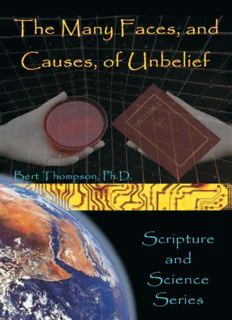Table Of ContentAPOLOGETICSPRESS
Apologetics Press, Inc.
230 Landmark Drive
Montgomery, Alabama 36117-2752
© Copyright 1999
© Copyright 2004 (second edition)
ISBN: 0-932859-74-7
Allrightsreserved.Nopartofthisbookmaybereproduced
inanyformwithoutpermissionfromthepublisher,exceptin
thecaseofbriefquotationsembodiedinarticlesorcriticalre-
views.
TABLE OF CONTENTS
CHAPTER 1 Introduction . . . . . . . . . . . . . . . . . . . . .1
CHAPTER 2 The Many Faces of Unbelief . . . . . . . .9
Atheism. . . . . . . . . . . . . . . . . . . . . . . . . . .9
Agnosticism. . . . . . . . . . . . . . . . . . . . . . .15
Skepticism. . . . . . . . . . . . . . . . . . . . . . . .20
Infidelity . . . . . . . . . . . . . . . . . . . . . . . . .24
Deism . . . . . . . . . . . . . . . . . . . . . . . . . . .30
Pantheism . . . . . . . . . . . . . . . . . . . . . . . .39
Panentheism . . . . . . . . . . . . . . . . . . . . . .49
CHAPTER 3 Causes of Unbelief . . . . . . . . . . . . . . .59
Bias Against God. . . . . . . . . . . . . . . . . . .61
Parents and Upbringing. . . . . . . . . . . . .66
Education . . . . . . . . . . . . . . . . . . . . . . . .70
Pride . . . . . . . . . . . . . . . . . . . . . . . . . . . .75
Immorality . . . . . . . . . . . . . . . . . . . . . . .80
Scientific Materialism. . . . . . . . . . . . . . .84
Intellectual Intimidation. . . . . . . . . . . . .88
Evil, Pain, and Suffering. . . . . . . . . . . . .94
HypocrisyorMisconductofBelievers. .105
Unjust Acts Committed by
Believers in the Name of God . . . . . . .108
Unbelief. . . . . . . . . . . . . . . . . . . . . . . . .115
CHAPTER 4 Conclusion. . . . . . . . . . . . . . . . . . . . .119
REFERENCES . . . . . . . . . . . . . . . . . . . . . . . . . . . . . .123
1
INTRODUCTION
Oneofthemostmind-numbingmysteriesforthosewho
believeinGodistryingtounderstandtheunbeliefofthose
whodonot.Asonewhowritesandlecturesoftenonthetop-
icsofapologeticsandevidences,Ifrequentlyamasked,“What
causespeoplenottobelieveinGod?”Generallyspeaking,
themotivebehindthequestionisnotderogatory,butcom-
plimentary.Thatistosay,thequeristreallyisasking:“Whyis
itthatobviouslyintelligentpeopledonotbelieveinGod?”
Neitherinquiryiseasytoanswer,becauseusuallytheper-
sonaskingthequestionwantsasimple,quick,concisere-
sponse.Itisdifficultforthequeristtounderstandwhypeo-
plewhoare“obviouslyintelligent”refusetobelieveinGod.
Ithasbeenmyexperiencethatrarelyisthereasinglereason
forunbelief,becauserarelyisthereasinglereasonthatcan
explainadequatelywhyapersonthinks,oracts,ashedoes.
Surely,however,apartoftheanswerhastodowiththe
factthatwhenGodcreatedhumans,Heendoweduswith
freedomofchoice(oftenreferredtoas“personalvolition”
or“freemoralagency”).Thisstandstoreason,considering
WhoGodis.TheBibledescribesHimasbeing,amongother
things,aGodoflove(1John4:8).Evenacursorysurveyof
theScripturesdocumentsGod’sdesirethatman,astheze-
nithofHiscreation,possess,andemploy,thefreedomof
choicewithwhichhehasbeenendowed.Thetruthofthe
matteristhatGoddidnotcreatemankindassomekindofro-
bottoserveHimslavishlywithoutanypersonalchoiceinthe
matter.
-1-
Forexample,whenJoshua—whohadledtheIsraelitena-
tionsofaithfullyforsolong—realizedthathisdayswerenum-
beredandhishourswerefew,heassembledtheentiretyof
thatnationbeforehimand,inoneofthemostmoving,im-
passionedpleasrecordedwithinthepagesofHolyWrit,ad-
monishedhischargestoemploytheirpersonalvolitionina
proper fashion.
AndifitseemeviluntoyoutoserveJehovah,choose
youthisdaywhomyewillserve;whethergodswhich
yourfathersservedthatwerebeyondtheRiver,or
thegodsoftheAmorites,inwhoselandyedwell:but
asformeandmyhouse,wewillserveJehovah(Joshua
24:15).
Joshua’spointcouldnothavebeenanyclearer.TheIsrael-
ites,individuallyandcollectively,hadtheability,andyes,
eventheGod-givenright,tochoosewhethertheywishedto
followJehovah.Asthetextcontinues,itindicatesthatonthis
particular occasion they chose correctly.
Andthepeopleansweredandsaid,Farbeitfromus
thatweshouldforsakeJehovah,toserveothergods....
AndIsraelservedJehovahallthedaysofJoshua,and
allthedaysoftheeldersthatoutlivedJoshua,andhad
knownalltheworkofJehovahthathehadwrought
for Israel (Joshua 24:16,31).
Yearslater,however,thepeopleofIsrael—employingthat
sameheaven-sentpersonalvolition—freelychosetoaban-
dontheirbeliefin,andobedienceto,God.Judges2:10-11re-
cords:
[T]herearoseanothergenerationafterthem,that
knewnotJehovah,noryettheworkwhichhehad
wroughtforIsrael.AndthechildrenofIsraeldidthat
whichwasevilinthesightofJehovah,andservedthe
Baalim.
WithinthepagesoftheNewTestament,theprincipleisthe
same.WhenJesuscondemnedtheself-righteousnessofthe
PhariseesinJohn5:39-40,Hemadethisobservation:“Ye
searchthescriptures,becauseyethinkthatinthemyehave
-2-
eternallife;andthesearetheywhichbearwitnessofme;and
yewillnotcometome,thatyemayhavelife.”ThePharisees
ofNewTestamenttimespossessedthesamefreedomofchoice
astheIsraelitesofOldTestamenttimes.ButwhiletheIsrael-
itestowhomJoshuaspokechoseatfirsttoheedhispleaand
obeyJehovah,thePhariseestowhomChristspokechoseto
ignore His plea and to disobey God.
Twochapterslater,whenJesusaddressedtheJewsintheir
owntemple,thetextindicatesthattheymarveledatHisteach-
ing(John7:15).ButJesusdemurred,andsaid:“Myteaching
isnotmine,buthisthatsentme.Ifanymanwillethtodohis
will,heshallknowoftheteaching,whetheritisofGod,or
whetherIspeakfrommyself”(John7:16-17).Jesus’pointto
thedevouttempleJewswasnodifferentthantheoneHehad
madeearliertothelegalisticPharisees.Godhasimbuedman-
kindwiththeabilitytochoose.Ifapersonwills,hecanac-
ceptGodandHisteaching,butGodneverwillforceHimself
onthatperson.AstheapostleJohnbroughtthebookofRev-
elationtoaclose,hewrote:“Hethatwill,lethimtakethewa-
teroflifefreely”(Revelation22:17).Theoperativephrase
here, of course, is “he that will.”
Butwhatofhethatwillnot?Freedomisaccompaniedby
responsibility.Withfreedomofchoicecomestheresponsi-
bilitytothinkcarefully,choosewisely,andactforcefully.Free-
domofchoicealwaysworksbestwhentemperedwithwis-
domandgoodjudgment.Thus,ineveryhumanactivitythe
processofrecognizing,believing,andproperlyutilizingtruth
isvitallyimportant.Especiallyisthistrueinthespiritualrealm.
JesustriedtoimpressthisuponHisgenerationwhenHesaid:
“Yeshallknowthetruth,andthetruthshallmakeyoufree”
(John8:32).Whatweashumanssooftenfailtorealizeisthat
wearenotinvolvedinasearchfortruthbecauseitislost;we
areinvolvedinasearchfortruthbecausewithoutit,weare!
Some,however,haveelectedtoemploytheirfreedomof
choicetoignorethetruthregardingGod’sexistenceandto
disobeyHisWord.Theyarethespiritualdescendantsofthe
first-centuryPharisees;theycouldcometoaknowledgeof
-3-
thetruth,buttheywillnot.Thesimplefactofthematteris
thatweareresponsibleforwhatwechoosetobelieve.Using
thepersonalvolitionwithwhichGodhasendowedus,we
maychoosefreelytobelieveinHim,orwemaychoosejust
asfreelytodisbelieve.Thechoiceisuptoeachindividual.
Andoncethatindividualhasmadeuphismindtodisbelieve,
Godwillnotdeterhim,asPaulmadeclearwhenhewrotehis
secondepistletotheThessalonians.Inthatletter,hespoke
firstofthosewho“receivednottheloveofthetruth”(2:10),
andthenwentontosaythat“forthiscauseGodsendeththem
aworkingoferror,thattheyshouldbelievealie”(2Thessa-
lonians 2:11).
What,exactly,wasPaulsuggesting?Wastheapostleteach-
ingthatGodpurposelycausesmentobelieveerror?No,he
wasnot.Paul’spointinthispassagewasthatwemaychoose
toacceptsomethingasthetruthwhen,infact,itisfalse.Be-
causeGodhasgrantedmanpersonalvolition,andbecause
HehasprovidedwithintheBibletherules,regulations,and
guidelinestogovernthatpersonalvolition,Hethereforewill
refrainfromoverridingman’sfreedomofchoice—evenwhen
thatchoiceviolatesHislaw.Godwillnotcontraveneman’s
decisions,orinterferewiththeactionsbasedonthosedeci-
sions.TheprophetIsaiahrecordedGod’swordsonthissub-
ject many years before when he wrote:
Yea,theyhavechosentheirownways,andtheirsoul
delightethintheirabominations:Ialsowillchoose
theirdelusions,andwillbringtheirfearsuponthem;
becausewhenIcalled,nonedidanswer;whenIspake,
theydidnothear:buttheydidthatwhichwasevilin
mineeyes,andchosethatwhereinIdelightednot
(Isaiah 66:3-4).
ConcerningthepeoplewhorefusedtohaveGodintheir
knowledge,andwhoexchangedtruthforerror,Paulrepeat-
edlystatedthat“Godgavethemup”(Romans1:24,26,28).
InhiscommentaryontheThessalonianepistles,Raymond
C.Kelcyaddressedthefactthatmenoftenprefertheconse-
quences of a certain belief system, and that as a result
-4-
Godgivesthemanovertothebeliefoftheliewhich
heprefers.Inasenseitmightbesaidthatthemeans
bywhichapersonisdeceivedisGod’spermissive
agency—not God’s direct agency (1968, p. 157).
ThereisanexactparallelintheinstanceofthePharaoh
whosparredwithMosesandAaronoverthereleaseofthe
HebrewsfromEgyptianbondage.Whenthesetwobrothers
arrivedatPharaoh’scourtasGod’sambassadorstodemand
thereleaseoftheenslavedIsraelites,theytoldthepaganpo-
tentate:“ThussaithJehovah,theGodofIsrael,‘Letmypeo-
plego’.”Pharaoh’sresponse,preservedinScriptureforpos-
terity,foreshadowedtheattitudeofmillionsofunbelievers
whowouldimitatethemilitantmonarch’sdemeanorofdis-
beliefthroughoutthecourseofhumanhistory:“WhoisJeho-
vah, that I should hearken unto his voice to let Israel go? I
knownotJehovah,andmoreoverIwillnotletIsraelgo”
(Exodus 5:1-2, emp. added).
SeveraltimesthebiblicaltextrecordsthatitwasGodWho
“hardenedPharaoh’sheart”(Exodus7:3;9:12;10:1,20,27;
11:10;14:8).Arewetounderstand,therefore,thatGodcaused
Pharaoh’sstubbornattitudeofdisbelief?Certainlynot.The
simplefactofthematteristhatGoddidnotcausePharaohto
hardenhisheartanddisobey,butinsteadpermittedtheruler’s
actions.TheScripturesspeaktothispointwhentheyacknowl-
edgethatPharaohhimself“hardenedhisheart”(Exodus8:
15,32;9:34-35).IntheircommentaryonthePentateuch,Keil
andDelitzschaddressedPharaoh’shardnessofheart,even
after he witnessed the miraculous plagues sent by God.
Aftereveryoneofthesemiracles,itisstatedthatPha-
raoh’sheartwasfirm,ordull,i.e.insensibletothe
voiceofGod,andunaffectedbythemiraclesper-
formedbeforehiseyes,andthejudgmentsofGod
suspendedoverhimandhiskingdom....ThusPha-
raohwouldnotbendhisself-willtothewillofGod,
evenafterhehaddiscernedthefingerofGodandthe
omnipotenceofJehovahintheplaguessuspended
overhimandhisnation;hewouldnotwithdrawhis
haughtyrefusal,notwithstandingthefactthathewas
-5-
Description:INTRODUCTION. One of the .. Sproul noted in regard to theism that “literally,
the word means. 'Godism Thomas Paine are classed as deists. Perhaps

